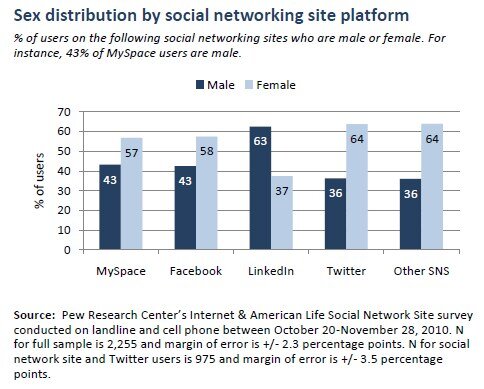Facebook Users More Trusting and Politically Engaged
The new Pew study out this week, Social networking sites and our lives, paints a very rosy picture of social networking (SNS). SNS is associated with more trust, larger networks, more political engagement and greater social support. Key findings from the study include:
♦ Facebook is the clear winner in the world of SNS. 59% of internet users use at least one SNS. 92% use Facebook.
♦ The majority of users of SNS are women, except in the case of LinkedIn, where almost twice as many men (63%) as women (37%) use the site.
♦ The average user of a social networking site has more close ties and is half as likely to be socially isolated as the average American.
♦ Facebook users are 45% more likely than non-internet users to feel that “most people can be trusted.”
♦ Facebook users have the highest degree of social support -- 8 points higher than non-internet users. They are 5 points higher in emotional and 11 points higher in companionship than non-internet users.
♦ Facebook and LinkedIn users are more politically engaged than other SNS users and non-SNS users.
♦ 40% of Facebook users have friended their core confidants.
When this study says that Facebook users tend to be more trusting, more politically engaged, and have more close ties, what this does mean? It could mean that more trusting, politically engaged and connected people tend to join and use Facebook. It could mean that the experience of social networking tends to bring out those qualities in us. It is hard to know the real role of Facebook in enhancing these critical qualities.
Bearing this in mind, there are some trends worth noting in the use of Facebook. The most used feature is the “like” button. This is a very low cost, relatively high reward way of saying, I am noticing. The second most popular feature is commenting on status updates. This action is a tiny bit higher cost and a bit more rewarding for both parties. I am doing a bit more than noticing; I am engaging.
Another notable trend is that we are increasingly using Facebook to stay in touch with those closest to us. 40% of us have friended our close friends and family. If Facebook used to be a place to reconnect with long-dormant acquaintances, it is now often a place to make a quick connection with people both near and far, geographically and emotionally. It is becoming a new channel in addition to phone, email and texting.
This raises a larger social question that the study does not address. What Facebook offers is a quick, fleeting engagement. We rapidly touch on many people, topics and updates. Photos from a friends’ vacation, quick congratulations on a life passage, updates on political issues, a shared laugh or memory. Touch. Touch. Touch. Yes, we may be maintaining our relationships via Facebook, but are we dumbing them down? Do we know a little bit about a lot of people and call that connection? In other words, are we redefining “close” and “friend” in such a way that skews the study results?
This past spring, my oldest son was home for spring break from his freshman year at college. I was somewhat surprised to learn that he had recently elected to disable his Facebook account. He was tired of keeping up with it, tired of how it reduced the nuances and complexities of who he and his friends are to somewhat random and shallow postings. One evening I was talking to him and some of his friends about it. One commented, “It is ridiculous. If you meet someone at a party, you don’t actually form an opinion of them until you get home and look them up on Facebook. There is something really wrong with that.”
SNS pioneers like Mark Zuckerberg want to think that Facebook IS our social graph. But in fact, the relationships that mean the most to us are those that we encounter in the flesh. We need to look in each other’s eyes, feel the discomfort of friction and have empathic reactions for real depth to develop. This question is out of scope for this study, but I would welcome a view on social networking that places it more clearly in the context of our full “social graph.” I personally would feel pretty isolated if Facebook or other SNS became a primary interface between me and my social world. For a number of young people, that has indeed become the reality and some are beginning to rebel.
The report feels somewhat breathy, and almost defensive, about the social value of SNS in general and Facebook in particular. They clearly state that they cannot find any evidence that SNS does harm to our social fabric. But they also can’t clearly link it to generating additional good. “Americans have more close social ties than they did two years ago. And they are less socially isolated. We found that the frequent use of Facebook is associated with having more overall close ties.” But they go on to say that there are likely other reasons we have developed more close ties in the past few years. Times of shared hardship are often good for social connection.
But the main conclusion of the study’s author, Keith Hampton, is a powerful plug for SNS. "If people on Facebook are getting all these great rewards, then there's a group of people out there who are really bad off," he said in an interview. "They have the smallest social network, fewer close ties, are way less likely to vote and are less involved with neighbors." Should I be worried about those I love who are not on Facebook, including my husband, my son and a number of dear friends? Are they really in danger of becoming socially irrelevant? I guess I better let them know.





